2014年七年级英语下册单词句型(人教版)(8)高品质版
人教版七年级下册英语单元必背句子与词组:Unit8
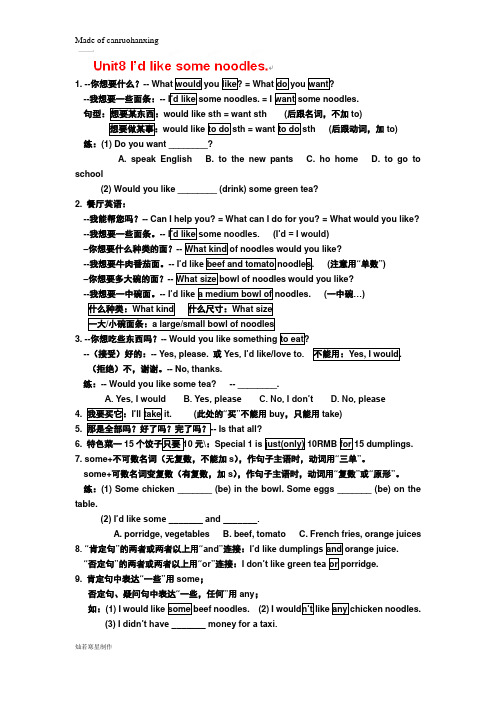
1. --你想要什么?-- What would you like? = What do you want?--我想要一些面条:-- I’d like some noodles. = I want some noodles.句型:想要某东西:would like sth = want sth (后跟名词,不加to)想要做某事:would like to do sth = want to do sth (后跟动词,加to)练:(1) Do you want ________?A. speak EnglishB. to the new pantsC. ho homeD. to go to school(2) Would you like ________ (drink) some green tea?2. 餐厅英语:--我能帮您吗?-- Can I help you? = What can I do for you? = What would you like? --我想要一些面条。
-- I’d like some noodles. (I’d = I would)–你想要什么种类的面?-- What kind of noodles would you like?--我想要牛肉番茄面。
-- I’d like beef and tomato noodles. (注意用“单数”)–你想要多大碗的面?-- What size bowl of noodles would you like?--我想要一中碗面。
-- I’d like a medium bowl of noodles. (一中碗…)什么种类:What kind 什么尺寸:What size一大/小碗面条:a large/small bowl of noodles3. --你想吃些东西吗?-- Would you like something to eat?--(接受)好的:-- Yes, please. 或Yes, I’d like/love to. 不能用:Yes, I would.(拒绝)不,谢谢。
人教版七下英语重点短语,句型总结

人教版七下英语重点短语,句型总结Here are some key phrases and sentence patterns for Grade 7 English (PEP Edition) in an informal and conversational style:1. Talking about abilities:I can speak a little English.Are you able to play the piano?I'm trying to learn how to cook.2. Describing daily routines:I usually wake up at 7 am every day.After school, I often go to the library to read.On weekends, I enjoy spending time with my family.3. Expressing preferences:My favorite food is pizza.I prefer reading books to watching TV.Would you like to go to the movies with me? (Myfavorite is action movies!)。
4. Talking about locations:Where do you live? I'm from Shanghai.Have you ever visited the Great Wall? It's amazing!My school is near the park, so I often walk there after class.5. Asking for and giving opinions:What do you think of this movie?I think it's quite boring.Don't you agree that music is an important part of culture?6. Making suggestions and plans:Why don't we go for a picnic this weekend?That sounds great! Where should we go?How about the park near the lake?。
人教版七年级下册重点短语及句型
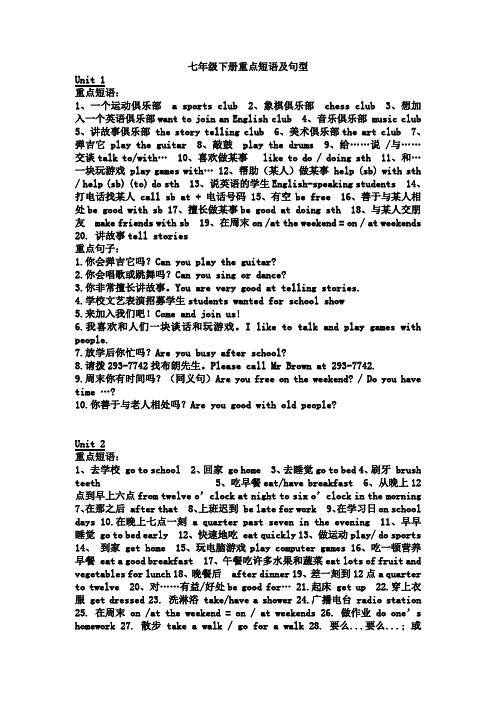
七年级下册重点短语及句型Unit 1重点短语:1、一个运动俱乐部 a sports club2、象棋俱乐部 chess club3、想加入一个英语俱乐部want to join an English club4、音乐俱乐部 music club5、讲故事俱乐部 the story telling club6、美术俱乐部the art club7、弹吉它 play the guitar8、敲鼓 play the drums9、给……说 /与……交谈talk to/with… 10、喜欢做某事 like to do / doing sth 11、和…一块玩游戏 play games with… 12、帮助(某人)做某事 help (sb) with sth / help (sb) (to) do sth 13、说英语的学生English-speaking students 14、打电话找某人 call sb at + 电话号码 15、有空be free 16、善于与某人相处be good with sb 17、擅长做某事be good at doing sth 18、与某人交朋友 make friends with sb 19、在周末on /at the weekend = on / at weekends 20. 讲故事tell stories重点句子:1.你会弹吉它吗?Can you play the guitar?2.你会唱歌或跳舞吗?Can you sing or dance?3.你非常擅长讲故事。
You are very good at telling stories.4.学校文艺表演招募学生students wanted for school show5.来加入我们吧!Come and join us!6.我喜欢和人们一块谈话和玩游戏。
I like to talk and play games with people.7.放学后你忙吗?Are you busy after school?8.请拨293-7742找布朗先生。
人教版七年级下册英语单词、重要短语及句型默写(101页)
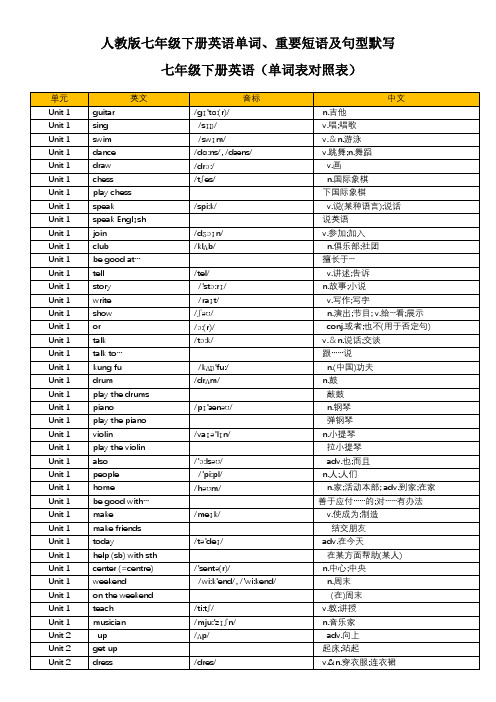
人教版七年级下册英语单词、重要短语及句型默写七年级下册英语(单词表对照表)七年级下册单词(汉译英)七年级下册单词(英译汉)人教版七年级英语下册重点短语及句型(对照表)Unit 1重点短语:1、一个运动俱乐部a sports club2、象棋俱乐部chess club3、想加入一个英语俱乐部want to join an English club4、音乐俱乐部music club5、讲故事俱乐部the story telling club6、美术俱乐部the art club7、弹吉它play the guitar8、敲鼓play the drums9、给……说/与……交谈talk to/with…10、喜欢做某事like to do / doing sth11、和…一块玩游戏play games with…12、帮助(某人)做某事help (sb) with sth / help (sb) (to) do sth13、说英语的学生English-speaking students14、打电话找某人call sb at + 电话号码15、有空be free16、善于与某人相处be good with sb17、擅长做某事be good at doing sth18、与某人交朋友make friends with sb19、在周末on /at the weekend = on / at weekends20. 讲故事tell stories重点句子:1.你会弹吉它吗?Can you play the guitar?2.你会唱歌或跳舞吗?Can you sing or dance?3.你非常擅长讲故事。
You are very good at telling stories.4.学校文艺表演招募学生students wanted for school show5.来加入我们吧!Come and join us!6.我喜欢和人们一块谈话和玩游戏。
人教版七年级英语下册课文重点句子
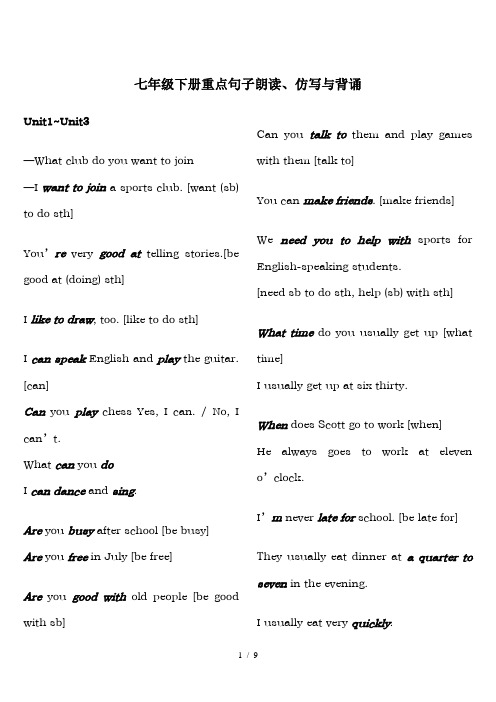
七年级下册重点句子朗读、仿写与背诵Unit1~Unit3—What club do you want to join—I want to join a sports club. [want (sb) to do sth]You’re very good at telling stories.[be good at (doing) sth]I like to draw, too. [like to do sth]I can speak English and play the guitar. [can]Can you play chess Yes, I can. / No, I can’t.What can you doI can dance and sing.Are you busy after school [be busy]Are you free in July [be free]Are you good with old people [be good with sb]Can you talk to them and play games with them [talk to]You can make friends. [make friends]We need you to help with sports for English-speaking students.[need sb to do sth, help (sb) with sth]What time do you usually get up [what time]I usually get up at six thirty.When does Scott go to work [when]He always goes to work at eleven o’clock.I’m never late for school. [be late for]They usually eat dinner at a quarter to seven in the evening.I usually eat very quickly.She always goes to bed early.When I get home, I always do my homework first.In the evening, I either watch TV or play computer games.[either …or…]She always eats ice-cream after dinner. She knows it’s not good for her, but it tastes good.[be good for]How do you get to school [how]I usually take the bus. [take the bus, by bus]How far is it from your home to school [how far]I’m not sure… about 10 kilometers.How long does it take you to get to school About 15 minutes by bike.[how long, it takes +人+时间+to do sth]Do you go by bus or by trainFor many students,it is easy to get to school.[it is +形容词+(for sb) +to do sth]There is a very big river between their school and the village. [there be, between…and…]There is no bridge and the river runs too quickly for boats.One 11-year-old boy, Liangliang, crosses the river every school day.He is like a father to me. [be like]It is their dream to have a bridge.Can their dream come trueUnit4~Unit6Don’t eat in class. [Don’t do sth…]Don’t arrive late for class. [arrive late for]Don’t be late for class. [be late for]You must be on time. [be on time] Don’t listen to music in class. [listen to]We must be on time for class. [must]We always have to wear the school uniform. [have to]We can eat in the dinner hall. [can] There are too many rules! [too many] After dinner, I can’t relax either. [either]—Why do you like pandas—Because they’re kind of interesting. [kind of]—Where are lions from—They’re from South Africa.I like dogs because they’re friendly and smart.The elephant is one of Thailand’s symbols. [one of…]This is a symbol of good luck. [a symbol of]But elephant are in great danger. [be in danger]Elephant can walk for a long time and never get lost.People cut down many trees so elephants are losing their homes.[cut down.]We must save the trees and not buy things made of ivory. [made of]—What’s she doing—She’s washing her clothes. [be +v.ing]—Are you doing your homework —Yes, I am. / No, I’m not. I’m cleaning my room.—Do you want to join me for dinner —I’d love to.Is Zhu Hui also watching the races and eating zongziBut there isn’t a Dragon Boat Festival in the US, so it’s like any other night for Zhu Hui and his host family. [any other]Zhu Hui misses his family and wishes to have his mom’s delicious zongzi.Zhu Hui likes New York and his host family a lot, but there’s still “no place like home.” [a lot]Unit7~Unit8—How’s the weather in Beijing—It’s sunny. /It’s cloudy. / It’s raining.—What’s the weather like in Shanghai —It’s hot and wet.—How’s it going—Great! / Not bad. / Terrible!How’s your summer vacationSounds like you’re having a good time.Can I take a message for him—Could you just tell him to call me back —Sure, no problem.I’m having a great time visiting my aunt in Canada.I’m also visiting some of my old friends.I’m so happy to see them again.It’s afternoon right now, and I’msitting by the pool and drinking orange juice.It’s warm and sunny, and it’s very relaxing here.My family and I are on a vacation in the mountains.I want to call you but my phone isn’t working, so I’m writing to you.It’s hot in your country now, isn’t itThe weather here is cool and cloudy, just right for walking.—Is there a hospital near here—Yes, there is. It’s on Bridge street.The pay phone is across from the library.—Where’s the hotel—It’s behind the police station.Well, I’m new in town.Just go along Bridge Street and turn left when you see the library. It’s on the right.I like to spend time there on weekends.I love to watch the monkeys climbing around.They look like my friends and me when we fight.To get there, I usually walk out and turn right on Bridge Road.To get to the park, you just have to cross Center Street.I enjoy reading there.Unit9~Unit10—What does your friend look like —She’s of medium height, and she has long straight hair.Are you going to the movies tonightI may be a little late.He has brown hair and wears glasses.Then Joe draws a picture of the criminal, and the police put it in newspaper and on television to find him.He has long straight brown hair and big eyes.In the end, the real criminal is a short and heavy old man, and he has short black hair.First of all, he is very tall and handsome.—What would you like—I’d like some noodles.—What kind of noodles would you like —I’d like beef noodles, please.—What size would you like—Large, please.We’d also like gongbao chicken and some mapo tofu with rice.—Would you like a large bowl—Yes, please.—May I take your order—Yes. / Sure. / Certainly. / Of course.—Is there any meat in the tomato and egg soup—No, there isn’t any. / No, there’s no meat.The number of candles is the person’s age.The birthday person must make a wish and blow out the candles.In china, it is getting popular to have cake on your birthday.They never cut up the noodles because the long noodles are a symbol of long life.They bring good luck to the birthday person.Unit11~Unit12—How was your trip last week—It was excellent/great.The farmer showed Carol around the farm.—Did you go to the zoo—No, I didn’t. I went to a farm.—Did you see any cows—Yes, I did. I saw quite a lot.We didn’t ride a horse, but we went for a walk.(go for a walk / milk a cow / ride a horse / feed chickentalk with a farmer / take some photos/pick some strawberriesgo fishing /go to the zoo /climb a mountain /visit a museum)We visited the science museum and it was really interesting.It was so cool.I took a lot of great photos, too.After that, I went to the gift shop and bought some lovely gifts for my parents. They weren’t expensive.It was an exciting day.I think today’s school trip was terrible. It was so hot on the slow train.The museum was big and boring. (difficult / lovely/ slow/ exciting/ boring/ cool/ hot/ lucky/ large/ expensive/ terrible/ delicious/ great/ cheap/ fast)At the museum, I learned a lot about robots.Everything was about robots and I’m not interested in that.There were also too many people and I couldn’t really see or hear the guide.I didn’t like the trip at all.—What did you do last weekend—I did my homework.(go boating/ go to the cinema/ camp by the lake/ go to the beach/ play badminton/ study for a test/ fly a kite)I worked as a guide at the Natural History Museum.As a special gift, our parents took us to India.I told the visitors about them and their living habits.I stayed up late to watch the soccer game.Father Mouse shouted at the cat.We shouted to our parents to let them know about the danger.The cat quickly ran away.There we put up our tents and made a fire to keep us warm and cook food on.On the first night, we just sat under the moon and told each other stories.But I was so tired that I went to sleep early.I was so scared that I couldn’t move.When we looked out of our tent, we saw a big snake sleeping near the fire.This woke the snake up and it moved into the forest near the lake.。
初中英语人教版七年级下册全册句型汇总(分单元编排)
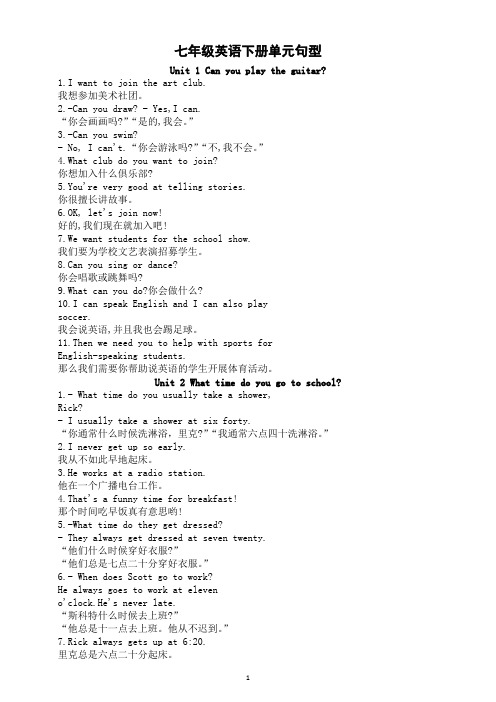
七年级英语下册单元句型Unit 1 Can you play the guitar? 1.I want to join the art club.我想参加美术社团。
2.-Can you draw? - Yes,I can.“你会画画吗?”“是的,我会。
”3.-Can you swim?- No, I can't.“你会游泳吗?”“不,我不会。
”4.What club do you want to join?你想加入什么俱乐部?5.You're very good at telling stories.你很擅长讲故事。
6.OK, let's join now!好的,我们现在就加入吧!7.We want students for the school show.我们要为学校文艺表演招募学生。
8.Can you sing or dance?你会唱歌或跳舞吗?9.What can you do?你会做什么?10.I can speak English and I can also playsoccer.我会说英语,并且我也会踢足球。
11.Then we need you to help with sports forEnglish-speaking students.那么我们需要你帮助说英语的学生开展体育活动。
Unit 2 What time do you go to school?1.- What time do you usually take a shower,Rick?- I usually take a shower at six forty.“你通常什么时候洗淋浴,里克?”“我通常六点四十洗淋浴。
”2.I never get up so early.我从不如此早地起床。
3.He works at a radio station.他在一个广播电台工作。
4.That's a funny time for breakfast!那个时间吃早饭真有意思哟!5.-What time do they get dressed?- They always get dressed at seven twenty.“他们什么时候穿好衣服?”“他们总是七点二十分穿好衣服。
2014年七年级英语下册单词句型(人教版)(8)完美版

9.Zhu Hui misses his family and wishes to have his mom's delicious zongzi.朱辉思念他的家人并希望吃上 他妈妈做的可口的粽子。
风,没有衣裳;时间,没有居所;它们是拥有全世界的两个穷人生活不只眼前的苟且,还有诗和远方的田野。你赤手空拳来到人世间,为了心中的那片海不顾一切。 运动太多和太少,同样的损伤体力;饮食过多与过少,同样的损伤健康;唯有适度可以产生、增进、保持体力和健康。 秋水无痕聆听落叶的情愫红尘往事呢喃起涟
1.—What+be+主语+doing?……正在做什么? —主语+be+doing sth.……正在做某事 2.I'd love/like to do sth.我愿意做某事 3.any other+可数名词单数 其他任何一个…… 4.wish to do sth.希望做某事 5.—What are you doing?你在做什么? —I'm watching TV.我在看电视。 6.—What's she doing?她在做什么? —She is washing her clothes.她在洗衣服。
7.—What are they doing?他们在做什么? —They're listening to a CD.他们在听一张CD唱片。 8.—Are you doing your homework?你在做你的家 庭作业吗?
人教版七年级下册各单元重点短语和句型汇总
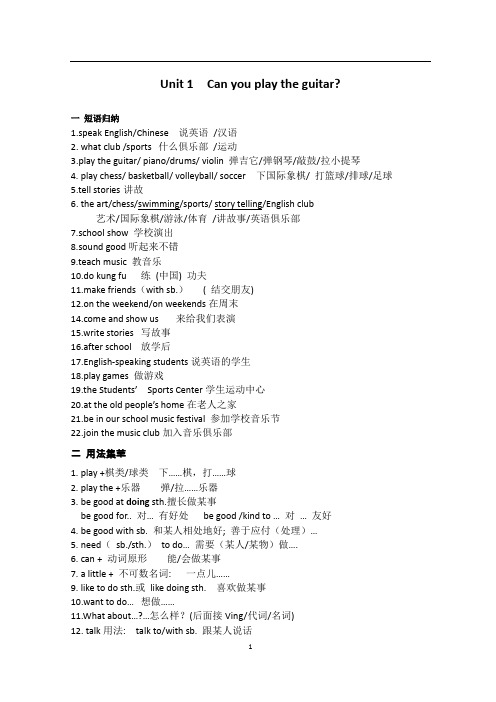
Unit 1 Can you play the guitar?一短语归纳1.speak English/Chinese 说英语/汉语2. what club /sports 什么俱乐部/运动3.play the guitar/ piano/drums/ violin 弹吉它/弹钢琴/敲鼓/拉小提琴4. play chess/ basketball/ volleyball/ soccer 下国际象棋/ 打篮球/排球/足球5.tell stories 讲故6. the art/chess/swimming/sports/ story telling/English club艺术/国际象棋/游泳/体育/讲故事/英语俱乐部7.school show 学校演出8.sound good听起来不错9.teach music 教音乐10.do kung fu 练(中国) 功夫11.make friends(with sb.)( 结交朋友)12.on the weekend/on weekends在周末e and show us 来给我们表演15.write stories 写故事16.after school 放学后17.English-speaking students说英语的学生18.play games 做游戏19.the Students’Sports Center学生运动中心20.at the old people’s home在老人之家21.be in our school music festival 参加学校音乐节22.join the music club加入音乐俱乐部二用法集萃1. play +棋类/球类下……棋,打……球2. play the +乐器弹/拉……乐器3. be good at doing sth.擅长做某事be good for.. 对…有好处be good /kind to …对…友好4. be good with sb. 和某人相处地好; 善于应付(处理)…5. need(sb./sth.)to do… 需要(某人/某物)做….6. can + 动词原形能/会做某事7. a little + 不可数名词: 一点儿……9. like to do sth.或like doing sth. 喜欢做某事10.want to do…想做……11.What about…?…怎么样?(后面接Ving/代词/名词)12. talk用法: talk to/with sb. 跟某人说话talk about sth. 谈论某事tell 用法:tell sb sth. 告诉某人某事tell sb to do sth 告诉某人去做某事tell stories 讲故事say用法:say直接加说话的内容/itspeak用法:speak +语言13.help sb. with sth在某方面帮助某人= help sb.(to)do sth14.be free /busy 有空/很忙15. call sb. at+号码拨打某人的……号码16. be in=join …成为…中的一员(P6)17.want …for the school show为学校表演招聘……三典句必背1. Can you draw? 你会画画吗?Yes, I can. / No, I can’t.是,我会。
- 1、下载文档前请自行甄别文档内容的完整性,平台不提供额外的编辑、内容补充、找答案等附加服务。
- 2、"仅部分预览"的文档,不可在线预览部分如存在完整性等问题,可反馈申请退款(可完整预览的文档不适用该条件!)。
- 3、如文档侵犯您的权益,请联系客服反馈,我们会尽快为您处理(人工客服工作时间:9:00-18:30)。
随着年岁的叠加,我们会渐渐发现:越是有智慧的人,越是谦虚,因为昂头的只是稗子,低头的才是稻子;越是富有的人,越是高贵,因为真正的富裕是灵魂上的高贵以 及精神世界的富足;越是优秀的人,越是努力,因为优秀从来不是与生俱来,从来不是一蹴而就。随着沧桑的累积,我们也会慢慢懂得:成功的路,其实并不拥挤,因为 能够坚持到底的人实在太少;所有优秀的人,其实就是活得很努力的人,所谓的胜利,其实最后就是自身价值观的胜利。人到中年,突然间醒悟许多,总算明白:人生, 只有将世间的路一一走遍,才能到尽头;生活,只有将尘世况味种种尝遍,才能熬出头。这世间,从来没有最好,只有更好。每天,总想要努力醒得比太阳还早,因为总 觉得世间万物,太阳是最能赐人力量和能量的。每当面对喷薄的日出,心中的太阳随之冉冉腾起,生命之火熊熊燃烧,生活的热情就会光芒四射。我真的难以想象,那些 从来不早起的人,一生到底能够看到几回日升?那些从来没有良好习惯的人,活到最后到底该是多么的遗憾与愧疚?曾国藩说:早晨不起,误一天的事;幼时不学,误一 生的事。尼采也说:每一个不曾起舞的日子,都是对生命的辜负。光阴易逝,岂容我待?越是努力的人,越是没有时间抱怨,越是没有工夫颓丧。每当走在黎明的曙光里, 看到那些兢兢业业清洁城市的“美容师”,我就会由衷地欣赏并在心底赞叹他们,因为他们活得很努力很认真。每当看见那些奔跑在朝霞绚烂里的晨练者,我就会从心里 为他们竖起大拇指,因为他们给自己力量的同时,也赠予他人能量。我总觉得:你可以不优秀,但你必须有认真的态度;你可以不成功,但你必须努力。这个世界上,从 来没有谁比谁更优秀,只有谁比谁更努力。我也始终认为:一个活得很努力的人,自带光芒万丈;一个人认真的样子,比任何时候都要美好;一个能够自律自控的人,他 的人生也就成功了大半。世间每一种的好,从来都只为懂得努力的人盛装而来。有时候,我真的感觉,人生的另一个名字应该叫做努力,努力了就会无悔,努力了就会无 愧;生活的另一种说法应该叫做煎熬,熬过了漫漫黑夜,天就亮了,熬过了萧萧冬日,春天就来了。人生不易,越努力越幸运;余生不长,越珍惜越精彩。人生,是一本 太仓促的书,越认真越深刻;生命,是一条无名的河,越往前越深邃。愿你不要为已逝的年华叹息,不要为前路的茫茫而裹足不前愿你相信所有的坚持总能奏响黎明的号 角,所有的努力总能孕育硕果的盛驾光临。愿你坚信越是成功的人越是不允许自己颓废散漫,越是优秀的人越是努力……生活中很多时候,我们遇到一些复杂的情况,会 很容易被眼前的障碍所蒙蔽,找不到解决问题的方法。这时候,如果能从当前的环境脱离出来,从一个新角度去解决问题,也许就会柳暗花明。一个土豪,每次出门都担 心家中被盗,想买只狼狗栓门前护院,但又不想雇人喂狗浪费银两。苦思良久后终得一法:每次出门前把WiFi修改成无密码,然后放心出门每次回来都能看到十几个人捧 着手机蹲在自家门口,从此无忧。护院,未必一定要养狗换个角度想问题,结果大不同。一位大爷到菜市场买菜,挑了3个西红柿到到秤盘,摊主秤了下:“一斤半3块 7。”大爷:“做汤不用那么多。”去掉了最大的西红柿。摊主:“一斤二两,3块。”正当身边人想提醒大爷注意秤时,大爷从容的掏出了七毛钱,拿起刚刚去掉的那个大 的西红柿,潇洒地换种算法,独辟蹊径,你会发现解决问题的另一个方法。生活中,我们特别容易陷入非A即B的思维死角,但其实,遭遇两难困境时换个角度思考,也许 就会明白:路的旁边还有路。一个鱼塘新开张,钓费100块。钓了一整天没钓到鱼,老板说凡是没钓到的就送一只鸡。很多人都去了,回来的时候每人拎着一只鸡,大家 都很高兴!觉得老板很够意思。后来,钓鱼场看门大爷告诉大家,老板本来就是个养鸡专业户,这鱼塘本来就没鱼。巧妙的去库存,还让顾客心甘情愿买单。新时代,做 营销,必须打破传统思维。孩子不愿意做爸爸留的课外作业,于是爸爸灵机一动说:儿子,我来做作业,你来检查如何?孩子高兴的答应了,并且把爸爸的“作业”认真 的检查了一遍,还列出算式给爸爸讲解了一遍不过他可能怎么也不明白为什么爸爸所有作业都做错了。巧妙转换角色,后退一步,有时候是另一种前进。一个博士群里有 人提问:一滴水从很高很高的地方自由落体下来,砸到人会不会砸伤?或砸死?群里一下就热闹起来,各种公式,各种假设,各种阻力,重力,加速度的计算,足足讨论 了近一个小时 后来,一个不小心进错群的人默默问了一句:你们没有淋过雨吗 人们常常容易被日常思维所禁锢,而忘却了最简单也是最直接的路有两个年轻人,大学毕
19.American adj.美国的;美洲的n.美国人;美洲人 20.any adj.任何的;任一的 pron.任何;任一 21.other adj.另外的;其他的 pron.另外的人(或物) 22.young adj.幼小的;年轻的 23.child n.儿童(pl.children) 24.miss v.怀念;思念 25.wish v.希望 26.delicious adj.可口的;美味的 27.still adv.还;仍然
7.—What are they doing?他们在做什么? —They're listening to a CD.他们在听一张CD唱片。 8.—Are you doing your homework?你在做你的家 庭作业吗?
—Yes.I am./No,I'm not.I'm cleaning my room.是的, 我在做。/不,我没有。我在打扫我的房间。
1.watch TV 看电视 2.read a newspaper 看报纸 3.talk on the phone 通过电话交谈 4.go to the movie(s) 看电影 5.use the computer 使用电脑 6.make soup 做汤 7.eat out 出去吃饭 8.Dragon Boat Festival 端午节
1.—What+be+主语+doing?……正在做什么? —主语+be+doing sth.……正在做某事 2.I'd love/like to do sth.我愿意做某事 3.any other+可数名词单数 其他任何一个…… 4.wish to do sth.希望做某事 5.—What are you doing?你在做什么? —I'm watching TV.我在看电视。 6.—What's she doing?她在做什么? —She is washing her clothes.她在洗衣服。
2013年秋(四清导航人教版) 七年级英语
Unit 6 I'm watching TV
早ቤተ መጻሕፍቲ ባይዱ手册
1.newspaper n.报纸
e v.使用;运用
3.soup n.汤 4.wash v.洗
5.movie n.电影 6.just adv.只是;恰好
7.house n.房子 8.drink v.喝 n.饮料
9.tea n.茶;茶叶
10.tomorrow adv.在明天 n.明天;未来
11.pool n.游泳池;水池
12.shop v.购物 n.商店 13.supermarket n.超市
14.man n.男人;人 15.race n.竞赛
16.study v.n.学习;研究 17.state n.州
18.the United States(of America)(abbr. the US, the USA)美国;美利坚合众国
